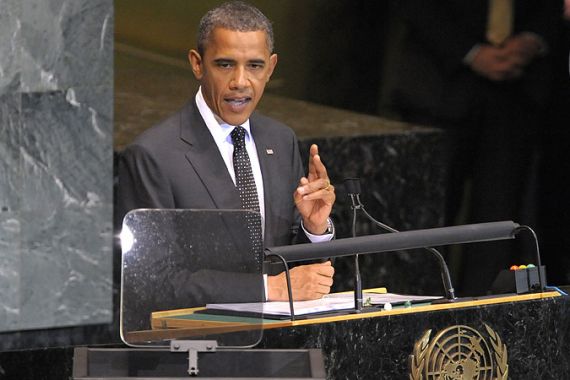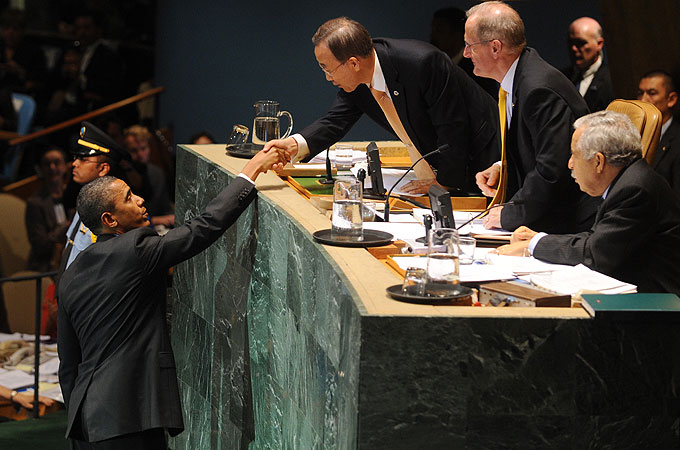Obama calls for new approach to aid
US president promises revamped policy to fight global poverty by focusing on development and reducing dependence on aid.

 |
| Obama, left, echoed major world leaders’ views on shifting to development-based policies to reduce poverty [EPA] |
Barack Obama has promised to re-focus US foreign aid policy toward promoting economic growth and fighting corruption as part of efforts to tackle global poverty.
The US president told a special UN summit on Wednesday that there is a need to switch to a results-based approach to aid instead of simply throwing money at development problems.
Keep reading
list of 4 itemsChina’s economy beats expectations, growing 5.3 percent in first quarter
Inside the pressures facing Quebec’s billion-dollar maple syrup industry
Manipur’s BJP CM inflamed conflict: Assam Rifles report on India violence
Obama’s 20-minute address echoed points made earlier by leaders of several major western economies about focusing on development and cutting down on dependence.
He said the practice of measuring poverty by the amount of money spent delivering food and medicine, while live-saving in the short term, had “not always helped poor countries develop”.
“We need more than just aid to unleash that change,” he told the 192-nation general assembly, advancing what he called a new US global development policy.
“We need to harness all the tools at our disposal – from our diplomacy to our trade and investment policies.”
Reducing poverty
The three-day UN poverty summit has reviewed progress so far in meeting globally-agreed targets to slash extreme poverty by 2015.
The meeting of 140 leaders was to issue a declaration agreed earlier this month promising to recommit to the so-called Millennium Development Goals (MDGs) issued by the world body 10 years ago.
|
“Let’s move beyond the old, narrow debate over how much money we’re spending and let’s instead focus on results – whether we’re actually making improvements in people’s lives” Barack Obama, US president |
Strong growth in China and India will help the world halve poverty and hunger but progress on other goals such as maternal and child health has been much slower.
Obama also gave his assurance that the overall US aid will not decline, as the new approach coincided with severe budget problems in many rich countries in the wake of the global financial crisis.
He said the US needed to be “big-hearted and hard-headed” in this matter and will seek partnership with countries that emphasised policies that promote economic growth and accountability and tackled corruption.
“Let’s move beyond the old, narrow debate over how much money we’re spending and let’s instead focus on results – whether we’re actually making improvements in people’s lives,” he added.
International aid group Oxfam said Obama’s speech clarified the US approach to fighting global poverty.
Several development experts had criticised the Obama administration for its lack of leadership on development issues.
“The purpose of development – and what’s needed most right now – is creating the conditions where assistance is no longer needed,” said Obama.
“So we will seek partners who want to build their own capacity to provide for their people.”
‘No blank cheques’
Nick Clegg, the British deputy prime minister, said developing nations “must understand that they will not receive a blank check” but acknowledged that Britain’s economic trouble “does not compare to the abject pain and destitution of others”.
Wen Jiabao, the Chinese premier, said developed countries should carry out their promises, saying their “assistance should be selfless and have no strings attached”.
Also on Wednesday, Ban Ki-moon, the UN secretary-general, launched a $40bn anti-poverty plan aimed at saving the lives of 16 million women and children over the next five years.
Current rates of maternal and child mortality were “simply unacceptable”, Ban told a meeting attended by several world leaders.
“The 21st century must be and will be different.”
The UN argues that investing in the health of women and children reduces poverty and stimulates economic growth.
But some anti-poverty advocacy groups were skeptical of the MDG summit.
Joanna Kerr, chief executive of ActionAid, called it an “expensive side-show that offered everything to everyone and nothing to no one.”
“An avalanche of warm sentiment cleverly concealed the fact that no fully funded plans of action for tackling poverty were actually announced,” Kerr said.